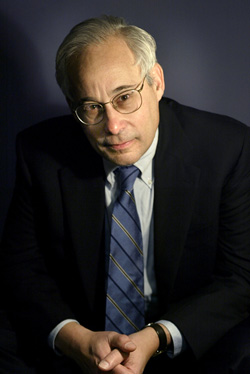
Champion of Change - Dr. Don Berwick
Donald Berwick, MD, MPP, Founder, President and CEO
of the Institute for Healthcare Improvement
Dr. Donald Berwick is one of America’s leading patient safety advocates. A clinical professor of pediatrics and health care policy at Harvard Medical School, Dr. Berwick is the founder, president and CEO of the Institute for Healthcare Improvement (IHI). For more than 20 years, he has been a positive force for health care quality improvements and a champion of transparency within the health care system. Dr. Berwick’s decades-long crusade has earned him a knighthood from the Queen of England, and he has been ranked as the third most powerful American in health care – behind Bill Gates and ahead of President Bush.
 Last year Dr. Berwick announced what even he acknowledges is probably his organization’s most ambitious project, the 100,000 Lives Campaign. His premise was simple: challenge hospitals to eliminate the estimated 98,000 deaths caused by medical errors in American hospitals each year.
Last year Dr. Berwick announced what even he acknowledges is probably his organization’s most ambitious project, the 100,000 Lives Campaign. His premise was simple: challenge hospitals to eliminate the estimated 98,000 deaths caused by medical errors in American hospitals each year.
“When I announced the campaign, I knew we were walking out on a limb. We were proposing to do something bigger than we had ever done. I didn’t know if hospitals would sign on to the campaign because they may not want to admit there are needless deaths.”
According to Dr. Berwick, the 100,000 Lives Campaign is a results-oriented project on an immense scale that was created to demonstrate what can happen when hospitals are committed to quality improvement.
Says Dr. Berwick, “The response to the “100,000 Lives” campaign has been overwhelming. It’s a total surprise to me,
Dr. Don Berwick(click on picture for larger version) |
and the most inspiring experience of my
whole professional career.”
More than 3,037 hospitals have committed to participate, representing 92 percent of the hospital beds in America. In addition, 74 percent of hospitals are reporting their mortality data directly to IHI. This level of reporting astounds Dr. Berwick, since most hospitals are reluctant to release such information unless required by law or a government agency.
“Hospitals don’t like to admit mistakes because they think many are not preventable. The feeling is that inevitably there will be deaths and injuries and the public needs to understand that things sometimes go wrong. But this doesn’t acknowledge that often deaths and injuries take place because of human or system error or a combination of both – both of which are preventable.”
To launch the campaign, Dr. Berwick and IHI set about recruiting some of the most influential health care organizations in the country. Among those he convinced to participate are the American Medical Association; American Nurses Association; Centers for Medicare & Medicaid Services (CMS), an agency of the U.S. Department of Health and Human Services; the Centers for Disease Control and Prevention; and the Joint Commission on Accreditation of Healthcare Organizations. The campaign encourages thousands of hospitals across the U.S. to make a commitment to implement the following actions within their facilities:
influential health care organizations in the country. Among those he convinced to participate are the American Medical Association; American Nurses Association; Centers for Medicare & Medicaid Services (CMS), an agency of the U.S. Department of Health and Human Services; the Centers for Disease Control and Prevention; and the Joint Commission on Accreditation of Healthcare Organizations. The campaign encourages thousands of hospitals across the U.S. to make a commitment to implement the following actions within their facilities:
- Deploy Rapid Response Teams…at the first sign of patient decline
- Deliver Reliable, Evidence-Based Care for Acute Myocardial Infarction … to prevent deaths from heart attack
- Prevent Adverse Drug Events (ADEs)…by implementing medication reconciliation
- Prevent Central Line Infections…by implementing a series of interdependent, scientifically grounded steps called the “Central Line Bundle”
- Prevent Surgical Site Infections…by reliably delivering the correct perioperative care
- Prevent Ventilator-Associated Pneumonia…by implementing a series of interdependent, scientifically grounded steps called the “Ventilator Bundle”
Through its partners, IHI has been able to leverage the involvement of thousands of hospitals in the campaign. According to IHI more than 63,000 lives have already been saved because of the campaign. For all the campaign’s success, Dr. Berwick sees this as just the beginning.
“I think patients’ families and consumers should be more involved in the patient safety movement. Frankly, at the risk of losing friends in health care, what we need is outrage. We need the public to say ‘no, I don’t want a health care system at any price, let alone close to two trillion dollars, which is going hurt me when it tries to help me.’ We need to hear that from the public.”
# # #
